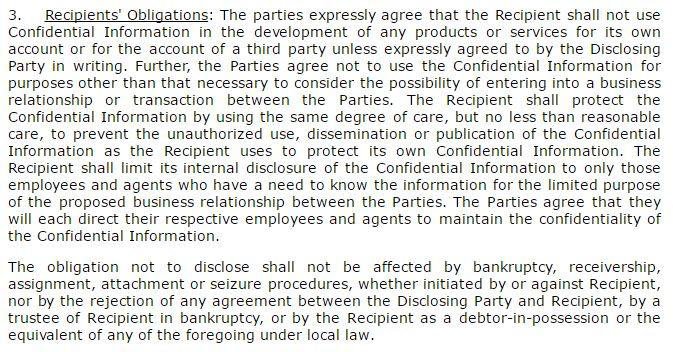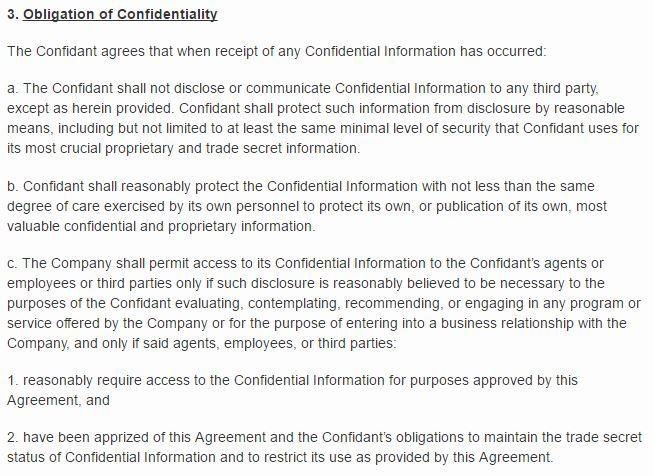NNN Agreements – Beware the traps for the unwary

China is one of the most popular countries in the world when it comes to manufacturing products. With a comparatively cheap labor force, competitive pricing and a wide variety of manufacturers and products to choose from, many American companies are attracted to outsourcing their manufacturing needs to China.
However, unlike Anglo-Saxon countries like the UK, Canada, Australia and Ireland, China is a communist country and its culture and laws have developed very differently from America’s.
Therefore, it would be a mistake to apply American-based laws and norms to China when it comes to business.
Are non-disclosure agreements (NDA) inadequate in China?
One such stark difference is the non-disclosure agreement (NDA) also known as a confidentiality agreement or confidential disclosure agreement.
The non-disclosure agreement is normally used in the US for protecting confidential information in potential partnership and negotiation meetings, employment hires, licensing partnerships, mergers and acquisitions and other business settings where confidentiality is paramount.
Because these non-disclosure agreements are the common tool of choice in the US for initial meetings involving the sharing of confidential and proprietary information, many American businesses have similarly relied on this type of legal agreement to protect their trade secrets and other confidential information when investigating and seeking quotes from potential Chinese partners and manufacturers.
This can be a huge mistake as many of these American companies have since discovered.
The reason is that although the agreement may be totally appropriate in the US, it’s inadequate to cover the unique challenges that you, as an American business, may face when working with Chinese manufacturers.
Most American companies working with Chinese manufacturers discover that an unethical manufacturer is not actually interested in exposing any confidential information or trade secrets to the public. Instead, such a manufacturer wants to use and exploit the information for its own gain and profits.
This, however, does not mean that non-disclosure provisions are not of value in China. It merely means that non-disclosure provisions have to be coupled with other legal protections in order to be fully effective.
Meet the Non-Disclosure, Non-Use And Non-Circumvention agreement (NNN)
An effective agreement to use for doing research, obtaining general quotes and initiating early negotiations with a Chinese manufacturer is a non-disclosure, non-use and non-circumvention agreement (NNN).
The NNN agreement not only incorporates non-disclosure provisions, but it also has provisions that prohibit a Chinese manufacturer from misusing the confidential information that it has obtained as a result of its working relationship with you.
The non-circumvention provisions from the agreement prohibit the Chinese manufacturer from copying your product, circumventing your business and selling the product directly to your own customers.

One of the reasons why the NNN agreement is so effective is because it provides for liquidated damages instead of injunctive relief.
Liquidated damages are a fine on the manufacturer for breaching any parts of the NNN. Often, a Chinese court will consent to issue a prejudgment for an initial seizure of assets from the Chinese manufacturer. Most Chinese manufacturers will do anything to avoid this.
Beware these additional traps
The NNN agreement is most effective when it is able to dissuade a potentially unscrupulous manufacturer from doing something that would breach the agreement.
As much as possible, you want to avoid having to resort to legal recourse to enforce the NNN as that not only gets expensive but it also means that a breach has occurred already.
Below are some traps for the unwary that could derail your efforts to create an effective NNN agreement:
-
Not including contractual clause that all modifications to NNN need to be signed by all parties.
It may be surprising to an American business but it’s not beyond unethical Chinese manufacturers to change terms of an agreement without letting you know that they did so and then getting you to sign off on something else within the same document.
Because of your signature on the document, it signifies agreement to all the changes, whether you were actually aware of them or not.
For example, a change in a particular clause could be hidden amongst many other clause changes in a contract with a large number of pages.
Here’s an example from Docracy:

-
Not labeling confidential information.
Even if you have a strong NNN agreement, you should still make it good practice to label all your proprietary and confidential information as “CONFIDENTIAL“.
In this way, there’s no dispute as to the status of a particular piece of information but more importantly, it creates awareness for the employees and agents of the Chinese manufacturer to take care of the information that you have provided to them.
-
Not choosing Chinese law as the governing law.
Although China does respect a foreign governing choice of law in an agreement, it will still apply Chinese civil procedure law.
Take note though that it can only apply a foreign governing law if there’s a foreign element involved, which would be applicable if you are an American-based company.
However, this does not apply to Sino-Foreign joint venture companies which are a partnership between a foreign-based company with a local Chinese party that shares profits, losses and risks in proportion to their capital investment the venture. With such Sino-Foreign joint ventures, only Chinese law can be applied.
More importantly, if you don’t choose Chinese law as your governing law, the court will require the parties to prove the foreign law that applies on every single important point requiring a decision and this is both time-consuming and expensive.
-
Avoiding the jurisdiction of Chinese courts.
This is another major trap for many American businesses to fall into.
Because many American businesses don’t know how the Chinese court system operates, they try to avoid the jurisdiction of the Chinese courts by choosing the jurisdiction of an American court, not realizing that it’s the Chinese courts that will be most quick and effective in obtaining an acceptable result for them.
Although an American court may issue a judgment in your favor, the Chinese court is not bound to enforce the judgment and so far, their practice is not to do so. This is because there is no treaty between China and the US that obligates China to enforce the American judgment. This means that even if you have an American judgment for injunctive relief or damages, it is basically worthless.
-
Avoiding the Chinese language.
It is understandable that if you don’t understand English, you would prefer that your NNN be written in English or a language that you are familiar with.
The problem with this though is that often times, there may be slight variations in meanings between the two different languages.
Since it’s more important for you to ensure that your Chinese manufacturer understands the full obligations of your NNN and therefore, makes an effort to comply, it would make more sense for your NNN to be in Chinese.
More importantly, if your NNN agreement needs to be enforced in a Chinese court but is not in Chinese, the Chinese judge would need to order a translation of your agreement.
Not only does this cause delays but even worse, there are not many competent translators that are able to do an accurate translation of legal terminology.
What may end up happening is that the translator produces one translation, your Chinese manufacturer claims another translation and you are adamant about what you really meant. The judge is then left with three different interpretations to decide between.
This puts you in the precarious position of having started a potentially expensive court case and being blind-sided by an uncertain outcome due to translation problems.
Another scenario that could occur is that no judge actually takes your case on because it’s not in Chinese and if this happens, there could be significant and costly delays in progressing your grievance.
If you don’t speak or read Chinese at all, what you could do is to request a translation copy of the Chinese NNN agreement into your preferred language from your lawyer.
-
Choosing two different languages as the official governing language for your NNN.
The same translation problems mentioned before apply when you choose to adopt two different languages as the official interpretation of the NNN agreement.
Again, what happens if both parties don’t agree on the exact meaning of a clause? The better way is to choose the Chinese language as the only official language of the agreement, at least for legal purposes.
You can still keep the English translation (or whichever preferred language of your choice) for your own records.
-
Choosing arbitration.
It’s often a common strategy for parties in America to include a clause that provides for arbitration as a first preference before heading to court.
China is indeed a signatory to the Convention on the Recognition and Enhancement of Foreign Arbitral Awards which means that technically, Chinese courts are required to enforce American arbitration awards.
However, there are a few problems with obtaining a successful outcome using arbitration in China.
Firstly, the Chinese manufacturer may sneakily choose not to attend the arbitration proceedings which means that any outcome that you obtain will be a default one.
Chinese courts do not like enforcing default arbitration judgments, especially if it’s a foreign-issued one. Often the Chinese courts consider a foreign-based judgment as an affront to their sovereignty and will find ways to refuse to comply.
If it cannot find an effective way to refuse the arbitration judgment, it may simply choose not to issue a ruling at all, causing your case to languish for years without progress.
If you include a clause in your NNN agreement that provides for arbitration, the Chinese manufacturer will most likely argue for arbitration proceedings to apply and claim that the Chinese court has no right to rule on your case without both parties having gone through arbitration.
-
Not getting all Chinese subcontractors to sign the NNN or omitting to make the Chinese contractor liable.
If you aren’t careful, your Chinese manufacturer may use subcontractors for your work and these subcontractors can vary considerably from week to week. If so, all of them will have access to your confidential information.
Unless you get the Chinese manufacturer to get your approval for every single subcontractor and require each and every single one of them to sign your NNN agreement, there’s the potential for any one of them to misuse and exploit your confidential information.
If possible, you should avoid agreeing to the manufacturer’s usage of any subcontractors.
However, if this isn’t possible and it is probably impractical to require all subcontractors to sign your NNN, you could opt to make the Chinese manufacturer liable for all their subcontractors actions. Many breaches and “leaks” of confidential information occur through subcontractors who may or may not be in partnership with the Chinese manufacturer to exploit your confidential information.
Here are two examples of clauses that require the manufacturer to be careful with who they share your confidential information with.
The first example is from LawMart.com:

And this example is from Docracy:

As vital as it is to have a well-constructed NNN agreement, it’s equally important that you take as many steps as you can to prevent any breaches. As they say, it’s better to place a gate at the top of the cliff rather than to have an ambulance at the bottom.
Credits: Icon Mousetrap by chris dawson from the Noun Project.
Jan 30, 2017 | Other Agreements
This article is not a substitute for professional legal advice. This article does not create an attorney-client relationship, nor is it a solicitation to offer legal advice.